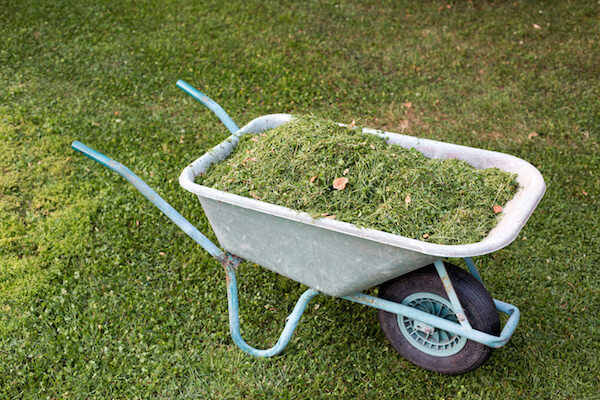
Some Great Things about Composting Grass Clippings
If you think your weekly mowing only produces useless lawn waste, think again. In the cycle of life, clippings serve as fine food for other useful organisms, even livestock. Since Florida represents one of 23 states that ban grass clippings from landfills, “grass-cycling” is pretty much becoming the norm in one form or another. How can you put your grass clippings to good use?
The Case for In-Lawn Composting
The easiest disposal method for your clippings is to just leave them on your lawn. Because they break down rather quickly, they tend to rapidly return their nitrogen and other nutrients back to the living soil. All you need to worry about is distributing them by rake or leaf blower should they clump together as you cut. Using a mower with a mulching blade chops the clippings even finer for better spread and faster decomposition. Earthworms and beneficial bacteria feast on the clippings and help you maintain healthy soil for your sod. They may even allow you to skip a round or two of fertilizing.
The Case for Garden Soil Composting
If you have flower or vegetable gardens, lawn clippings and leaf litter can really beef up your soil-amending compost. Using your free yard waste, you may never again need to resort to bag after expensive bag of ready-made compost and fertilizers from the garden center. Where your soil is too sandy, grass clippings help hold moisture, slow the drainage and discourage nematodes. Where it’s too clayey, the yard waste loosens the earth to permit aeration and water conduction, all while donating vital nutrients.
Why You May Wish to Remove Clippings from the Lawn
A common and persistent myth says that leaving your clippings on the lawn causes or contributes to thatch. However, thatch occurs when the stolons, stems and crowns — soil-level turf elements — die off and fail to decompose rapidly. Thatch won’t develop from your lawn clippings, but certain sod varieties, such as some zoysiagrasses, tend to produce thatch, and when the clippings rest on top of the impenetrable thicket of dead stolons and stems, they can’t reach the soil and help nourish it. In this case, bagging the clippings for a compost heap may serve you better.
Also, some lawn care professionals insist that they see no difference in lawns that receive mulched grass clippings. They prefer to remove them and send them to composting facilities, or maybe use them as a mulch elsewhere in the landscape. If you prefer to use them as mulch around flowers, shrubs and trees, just remember to keep the layer at about one inch. Any deeper, and it may form a mat that resists water instead of absorbing it. Additionally, leave a few inches around trunks and stems to discourage fungal growth and water rot.
Many municipalities or counties provide a composting service for yard waste. So, if you live in one that does, you can still get rid of your clippings if you have no other use for them.
What Else Can You Do with Lawn Clippings?
Thanks to some forward-looking entrepreneurs, grass clippings can become silage (a fermented fodder for animals often used during winter when the herd has no growing grass upon which to graze). It’s great for ruminants such as cattle and sheep. One might wonder why nobody thought of this as an industry before. Because lawn waste can be gathered for nearly no cost, and it has plenty of supplementary nutritional value along with grains and hay, feed lots stand to cut costs and gain a lot from unwanted lawn clippings. However,horses can’t handle grass well, so never let them eat clippings. Although Florida ranchers may have little need at this time with our long growing season, perhaps businesses will sprout up to acquire fresh clippings everywhere and deliver them to the ranchers in colder zones where winter feed comes with a higher cost.
Not only does yard waste contribute to the food sources of other organisms, a deliberate composting plan also helps the environment in another way. Too often, homeowners or their lawn mowing services, simply sweep the clippings to the street, hoping either the rain or street sweepers will take it off their hands. Sadly, clippings washed away by the rain can end up clogging the water courses and feeding algae, creating serious problems downstream. Fortunately, with all the good you can squeeze out of your lawn clippings through composting, you’ll come to see each cut blade as something too good to discard.